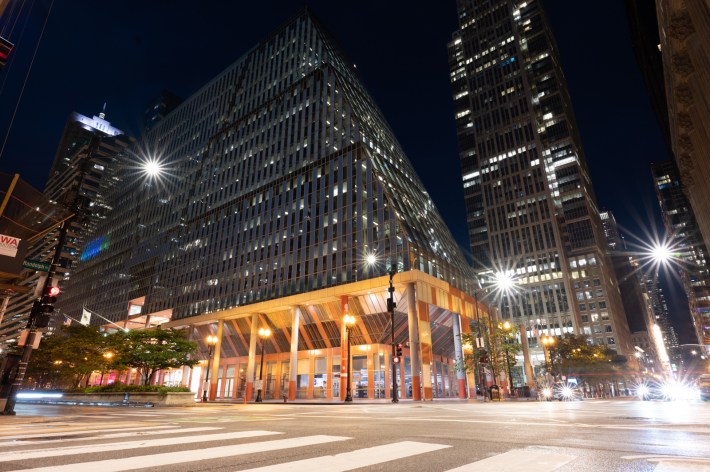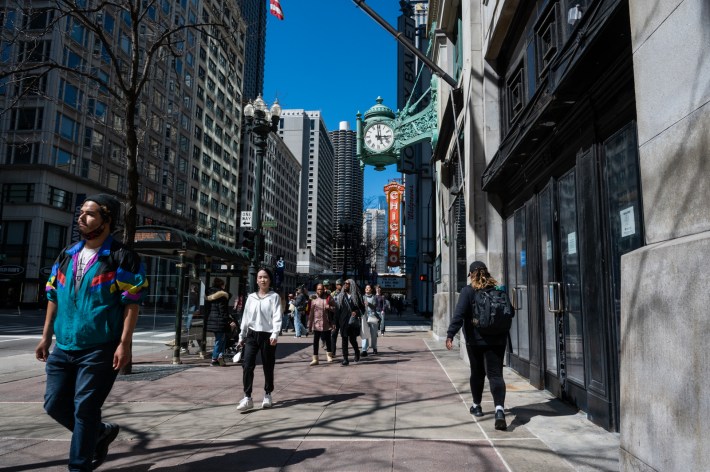DOWNTOWN — The $105 million sale of the Thompson Center to Google has the potential to restructure the Loop by bringing in more residents — and, with them, residential developments, real estate experts say.
Developers, investors and real estate executives are watching the market closely after the tech giant announced in July that it will redevelop the Thompson Center for office use, potentially bringing thousands of workers Downtown.
The workers will need a place to live — and many will want to be nearby, said Ben Creamer, principal and managing broker of Downtown Realty Company.
The company works with more than 300 properties in and around the central business district in the Loop and has seen a large number of people moving Downtown to be closer to work over the years as convenience has become a No. 1 priority, Creamer said.
“It’s so important for people to have a convenient commute, and being able to walk to work is such an important part of that,” Creamer said.
Now, Creamer and other industry experts are watching the Loop for what they are calling the “the Google effect:” a spike of real estate investment around the Thompson Center.
“As we continue to see more people move closer to the office… I think it’s going to have a huge effect,” Creamer said.
 Credit: Colin Boyle/Block Club Chicago
Credit: Colin Boyle/Block Club ChicagoWith office occupancy rates continuing to hover around 46 percent compared to 2019 levels, Creamer and other industry experts think vacant office buildings will be converted to condos and apartments.
The first real test of this hypothesis is the impending sale of 33 N. LaSalle St., a 38-story art deco skyscraper which serves as an office building. It’s the first major Loop building to hit the market since Google’s July announcement, according to a report from CoStar.
The skyscraper is being marketed as a desirable office location, mentioning the addition of Google at the Thompson Center as a top selling point in its executive summary. Currently at 71 percent occupancy, the building has the potential to add more workers based in the Loop — or it could lend itself to a residential conversion.
John Sheridan, executive vice president for James McHugh Construction Co., said other notable properties in the area are considering adaptive reuse, meaning they could convert offices into residential or hotel units.
Those include 135 S. LaSalle St., 65 E. Wacker Place and 19 S. LaSalle St., Sheridan said. He’s not intimately familiar with 33 N. LaSalle St., but he thinks it could also be a contender for a conversion.
“We’re almost always looking at a couple of buildings Downtown to be converted into a hotel or residential use from office use,” Sheridan said.
Conversion of historical buildings can also come with tax incentives to alleviate the cost of construction, making them attractive to developers. On the other hand, such projects can take years to get off the ground, with their success dependent on good planning and working at the “right time,” Sheridan said.
Adding to the Google effect: Pandemic construction delays have created a lucrative market for apartments and condos, with high demand and low supply. This year, developers will complete 1,500 units Downtown, but the normal average from previous years is around 4,000, Creamer said.
 Credit: Colin Boyle/Block Club Chicago
Credit: Colin Boyle/Block Club ChicagoCreamer expects the market to start balancing out in 2024, two years before Google is expected to complete construction and move into the Thompson Center. Because of this, renters can expect to be confronted with higher prices — but building conversions could add to the market and balance out prices in the future, Creamer said.
Residential conversions also tend to have larger floor plans, with some offering more affordable options than “ground-up construction,” Creamer said.
Sheridan believes the Loop will continue to see conversions and adaptive reuse projects ahead of Google’s move-in date — but those projects aren’t all a result of the tech giant, as all of Downtown has seen adaptive reuse as the city’s landscape evolves.
Tribune Tower, London House Hotel, the Virgin Hotel and the Dearborn Tower in the South Loop have been adaptive reuse projects in recent years.
“You can go up and down throughout the city — there are a huge number of buildings [that are conversions]. So I think this will continue to be a trend that we’ll see more and more over time,” Sheridan said.
Listen to “It’s All Good: A Block Club Chicago Podcast”: